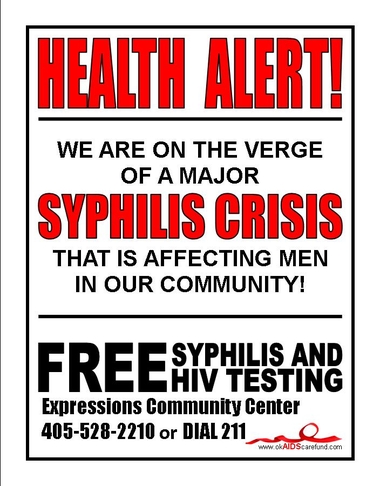Pay attention guys: syphilis is on the rise

(Oklahoma City) 2012 was not a good year for some gay and bisexual men. Why you ask? Well, there were 64 cases of infectious syphilis diagnosed in men who have sex with men (MSM) and bisexual males. Of those 64 cases, over half of those men also have HIV. In addition to OKC, some of these cases were across the state.
Did you know?
- A person is two to five times more likely to get HIV if exposed when syphilis sores are present
- Studies have also shown that syphilis will increase the viral load of someone who is already HIV infected
“The good news is it’s a simple blood test to find out if you have syphilis, and it’s curable,” said Sally Bouse, MPH, CHES Manager of HIV Prevention and Training at the Oklahoma State Department of Health. “The bad news is since people often miss the symptoms of syphilis, they don’t see themselves at risk and don’t get tested. Syphilis can cause serious problems, even death, if left untreated.”
Syphilis is a sexually transmitted disease (STD) caused by a bacteria, and there is an increase among Men who have Sex with Men (MSM) in the Oklahoma City/metro area. It has often been called “the great imitator” because so many of the signs and symptoms are indistinguishable from those of other diseases.
Syphilis is usually passed from person to person through direct contact with a syphilis sore during oral, vaginal or anal sex. Because syphilis sores can be hidden in the rectum, mouth or vagina, it may not be obvious that a sex partner has syphilis. Syphilis symptoms are easy to miss, and easy to mistake for something else. Even if you don’t notice symptoms, you can still have syphilis.
Each stage of syphilis looks different. The initial infection causes an ulcer at the site of infection. Syphilis then spreads from the initial ulcer of an infected person to the skin or mucous membranes of the genital area, the mouth, or the anus of a sexual partner. It also can pass through broken skin on other parts of the body. The most common way to get syphilis is to have sex with someone who has an active infection.
Medical experts describe the course of the disease by dividing it into four stages--primary, secondary, latent, and tertiary (late). An infected person who has not been treated could infect others during the first two stages, which usually last one to two years. In its late stages, untreated syphilis, although not contagious, can cause serious heart abnormalities, mental disorders, blindness, other neurologic problems, and death.
Of increasing concern is the fact that syphilis increases the risk of transmitting and acquiring the human immunodeficiency virus (HIV) that causes AIDS. Approximately fifty percent of gay males with syphilis also have HIV.
Because syphilis is caused by bacteria, it is curable, and effectively treated with antibiotic therapy. Sexually active people should consult a medical professional about any suspicious rash on the body or sore in the genital area. Those who have been treated for another STD, such as gonorrhea, should be tested to be sure they have not also acquired syphilis.
The spread of syphilis can be stopped by treating all recent sex partners before the disease can be spread to others. Also, using a condom correctly and consistently can reduce the risk of syphilis. You should note, though, that if the syphilis sore or open rash is not in an area protected by the condom, you could still get syphilis. And if you have oral sex without a condom (giving or getting), you can still get syphilis.
Free syphilis testing and treatment for it is readily available. You can get free testing at the following locations, your local county health department, or dial 211 to find the location nearest to you:
Expressions Community Center Monday 2pm-6pm
2245 NW 39th Street Tuesday and Thursday 4pm-8pm
Friday 10:30am – 5pm
Guiding Right, Inc. Monday and Wednesday 10am-4pm
7901 NE 10th Street, Suite A-111
Midwest City
Latino Community Development Agency Monday and Wednesday 10:30am-5pm
420 SW 10th Street Tuesday 10:30am-1pm
Friday 9am-5pm
September 16, 2013





